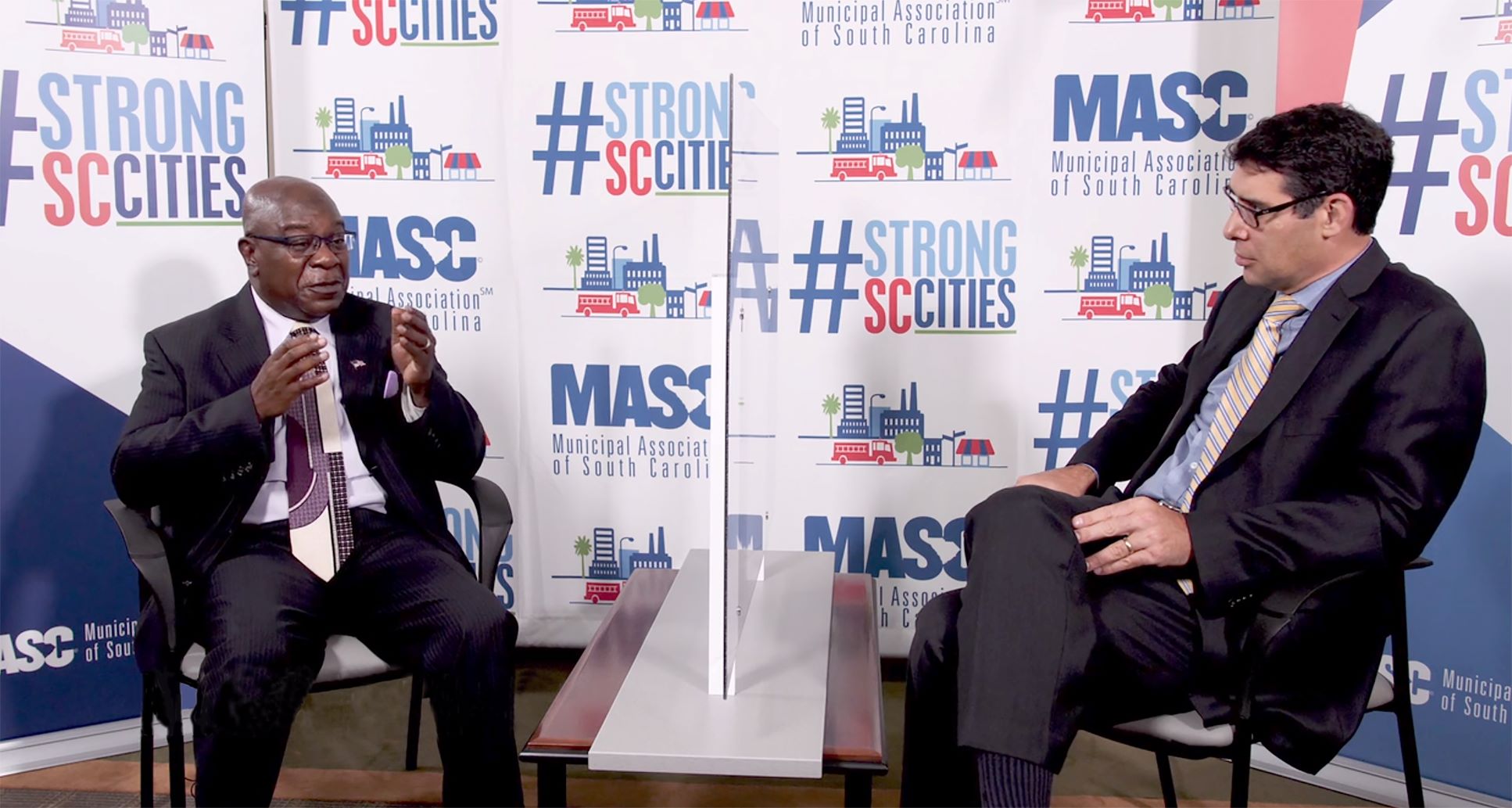The killing of George Floyd by Minneapolis police in May led to protests and civil unrest around the nation and wider discussions on race relations and police procedures.
Both the City of Lake City and the City of Florence were among the communities to have protests. The mayors of those cities — Lovith Anderson Jr. in Lake City and Stephen Wukela in Florence — discussed these events and other challenges during a session of the Municipal Association of SC Virtual Annual Meeting. The videos, first made available in July, are still available on the Municipal Association’s website.

Lake City’s Mayor Lovith Anderson Jr., left, talks with Florence Mayor Stephen Wukela as part of the Municipal Association’s 2020 Virtual Annual Meeting.
The two mayors recalled instances of civil rights activism in their communities. Anderson remembered a time from his childhood when Martin Luther King Jr. visited Lake City. He recalled the tension in the community — the gun his uncle kept in the front seat of his car for the event — as well as the power of King’s words.
The 12- and 13-year-old boys present were normally rambunctious, Anderson said, but when King spoke, "you could hear a pin drop."
Both mayors spoke of what they had learned from local civil rights leaders. Wukela spoke of the recently deceased Rev. William Diggs, who had served as pastor of Florence’s historic Trinity Baptist Church. He remembered Diggs’ stories of organizing sit-in protests in Rock Hill and making sure protesters remained nonviolent in the face of harassment and physical assaults. Anderson spoke of the Rev. Joseph DeLaine, a civil rights leader who fought for desegregation and left South Carolina for good after the difficulties of his time in Lake City.
"There is so much history in the Pee Dee," Anderson said. "A lot of it has not all been pleasant. And sometimes we try to shelter our children and shelter ourselves from it, as though it will disappear. But it doesn’t when you have to look at each other for who we are and what we are and accept everybody as our brothers and sisters, and move forward."
Wukela described the importance of relationships and trust when working as a mayor. He described a 2018 incident when a Florence police officer began a traffic stop, and then a state constable shot the motorist nonfatally. The event happened late on a Saturday night. Wukela immediately moved to call community leaders to indicate that the city would release all video footage as quickly as possible.
"I submit to any mayors who are watching or any councilmembers who are watching, if you can’t pick up the phone and call leadership in the Black community or white community at 2 o’clock in the morning and have them answer your call and already be comfortable and have a close, honest relationship with them, you’re not doing your job, I think, as mayor," he said.
Wukela described dashboard camera and body camera footage as "extraordinarily valuable to us."
Providing footage to community leaders, he said, also allows the city to say, "Here’s what happened. This is not me telling you what happened. This is not my version of what happened. This is not an edited portrayal of what happened. This is what happened, and now let’s talk about it."
Anderson also spoke of the importance of building relationships over time, among various community leaders and among children. Before he began to serve on council, he said his young son once used a water gun to shoot at a police officer. The officer wanted to take his son to the police station..
"I said, ‘can you imagine what that would do to him?’ So I said, ‘if he needs to come downtown, I will bring him, and we’ll sit down in the chief’s office and have a conversation,’" Anderson said. "It was the fact that the officer didn’t put so much pride in himself that we didn’t go to the station and have that conversation. Then, my son ended up becoming a police cadet. They got to be together all the time. These are experiences that children need to have along with adults, in communication with each other," Anderson said.
Wukela noted that in Florence, some residents are engaged and ask for police presence in particular situations.
"That stands in contrast to some of this fear of police, and ‘defund police’ arguments you hear in some places. We’re not hearing that in our communities. What we’re hearing is ‘we want them here, we want to know them,’" he said.
He added that in planning for the protests that took place, the city worked to make sure that the police were not in tactical gear, which can be threatening.
"They were present, they were marching with the marchers, they were providing water. They were certainly enforcing the law, but they weren’t in a confrontational stance," he said.
Find the conversation between Anderson and Wukela, as well as all other Virtual Annual Meeting videos online.
